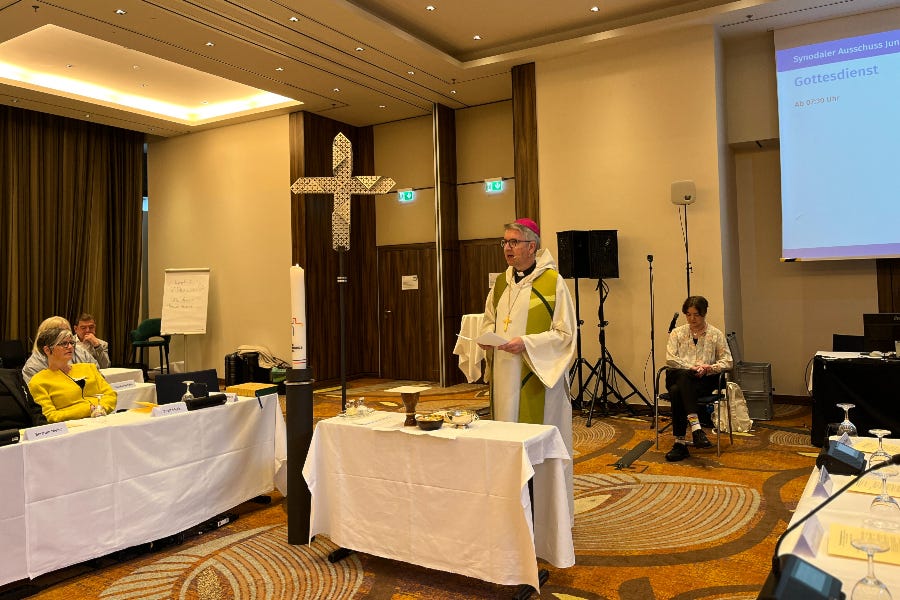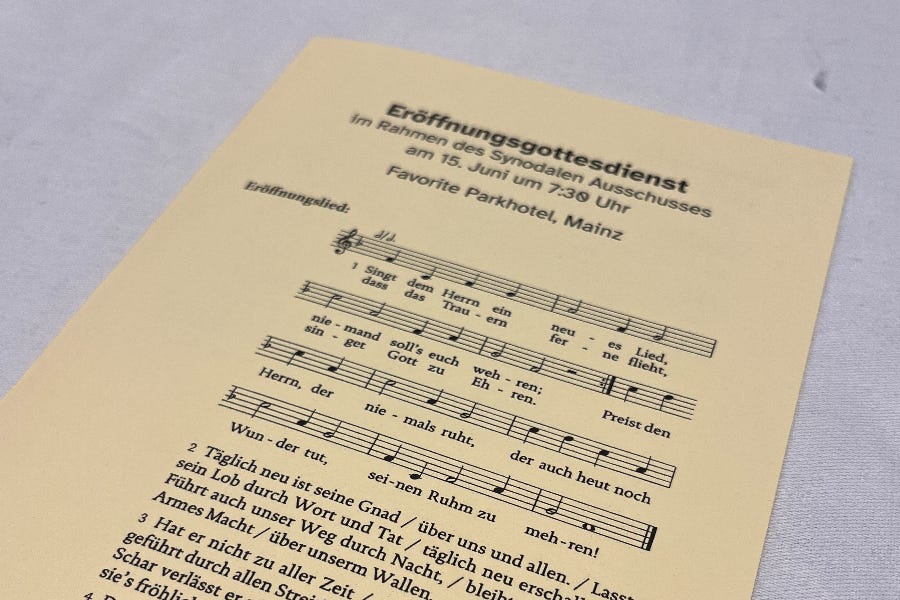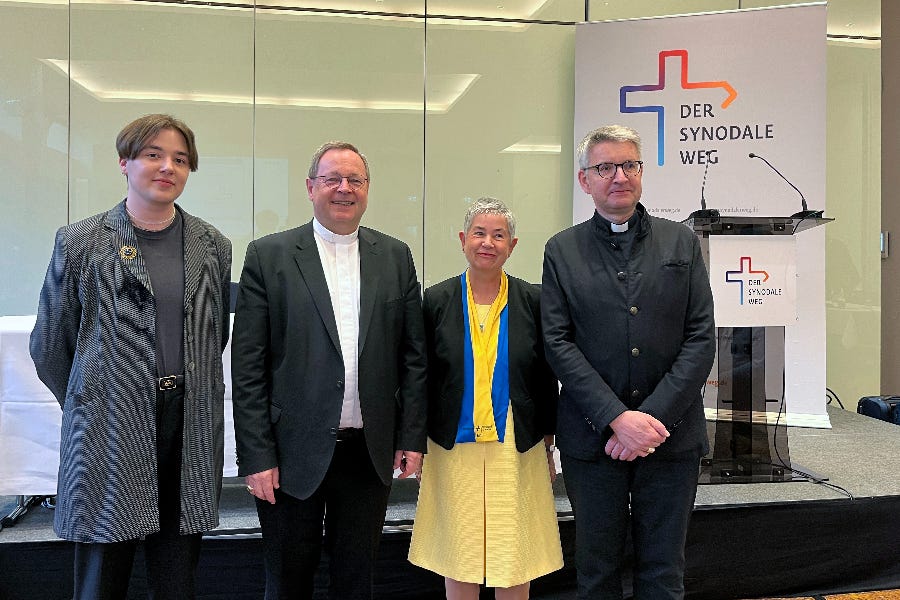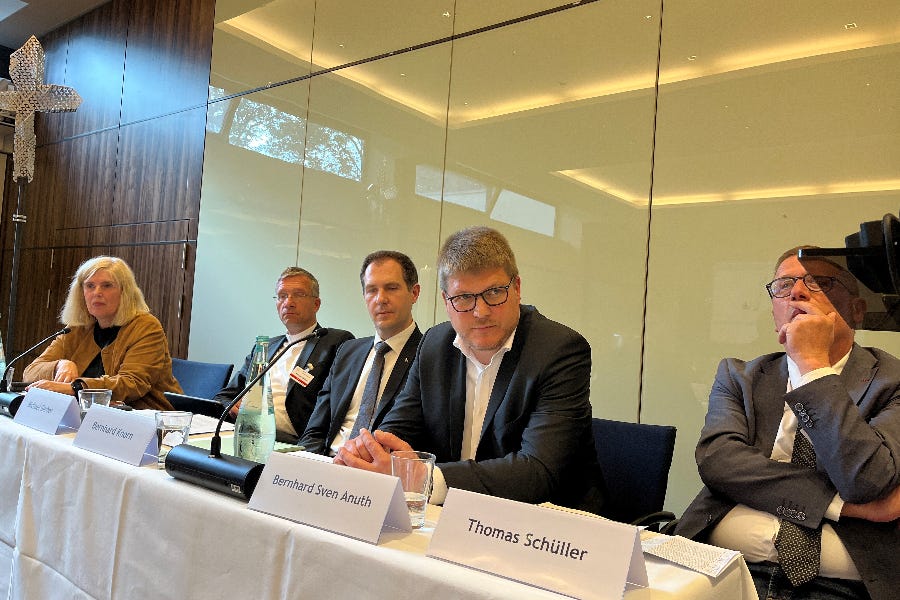Germany’s “synodal committee” took a significant step toward the creation of a permanent nationwide synodal body during a two-day meeting in Mainz last week.

The synodal committee was established at the end of the country’s controversial “synodal way” in 2023, to lay the groundwork for a permanent “synodal council” of bishops and lay people by March 2026.
Although the Vatican has vetoed the synodal council as envisaged in a 2022 synodal way resolution, members of the synodal committee signaled at their June 14-15 meeting that they remain committed to establishing the permanent body in some form.
In a June 14 press release, synodal committee organizers said that one of the intermediate body’s central tasks was the “preparation of a nationwide synodal body that complies with canon law.”
A June 15 press release announced that the synodal committee had established three 10-member commissions, the first of which will address “the possible organization of a synodal council.”

The first commission’s members include Essen’s Bishop Franz-Josef Overbeck, the canon lawyer Thomas Schüller, and Thomas Söding, the vice-president of the influential lay Central Committee of German Catholics (ZdK).
In a June 17 interview with domradio.de, Söding noted that Rome had “given the green light” for the next phase of the synodal way.
The go-ahead followed a meeting of German bishops and Vatican officials in March, at which the bishops agreed to submit future synodal way developments to the Holy See for approval. But four of Germany’s 27 diocesan bishops are boycotting the synodal committee.
Söding said: “We are aiming for 2026. We can take up the impetus from the second part of the global synod in October 2024 and will do so. At the same time, we will use the time to be prepared to set up a big synodal council. If it is not called a synodal council, that is not tragic.”
“The point is that, on the one hand, the participatory structures that have been strongly developed in Germany will be sustainably further developed and, on the other hand, that the authority of the bishops and the bishops’ conference will be interlinked in a good way with the rights of participation from the people of the Church, which have been neglected to date.”

At the Mainz meeting, the 64 participants in the synodal committee elected two new members to the body’s steering committee, joining German bishops’ conference chairman Bishop Georg Bätzing and ZdK president Irme Stetter-Karp.
The new steering committee members are Bishop Peter Kohlgraf of Mainz, who hosted the two-day meeting, held at the four-star Favorite Parkhotel, and Mara Klein, a research associate at the University of Münster.
Klein, who identifies as nonbinary and transgender, said that two members were added to the steering committee to make it “as generationally and gender-balanced as possible.”
“I am aware that I am often the first trans person or first nonbinary person that a person encounters and that how this whole group is perceived depends on the encounter with me — whether consciously or unconsciously,” Klein told katholisch.de, the official news website of the Catholic Church in Germany.
“I know that I can never do justice to this. I cannot speak for an entire group. Nor am I representative of this group. Nevertheless, I hope to have a symbolic effect that gives trans people, diverse people, and non-binary people in the Church more self-confidence and a sense of self-efficacy.”
Klein criticized the Vatican declaration Dignitas infinita following its publication in April, saying that “the suggestion that gender-affirming health care … might risk or diminish trans people’s dignity is not only hurtful but dangerously ignorant.”
Katholisch.de reported that Klein and Bishop Kohlgraf delivered a “dialogue sermon” at a Mass celebrated June 15 in the synodal committee meeting hall. The “dialogue sermon,” in which a priest preaches in tandem with a lay person, is an established feature of German Church life.
"A yes to synodality is also a yes to movement, to uncertainty, to ambiguity, to conflict, and to irritation,” Mara said.
On the eve of the Mainz meeting, the German Catholic group New Beginning said it had appealed to Rome to rule to whether the synodal committee’s constitution “complies with or violates the Church’s legal order.”

The committee’s canonical status was also discussed at the meeting, the second plenary assembly of the synodal committee following the body’s inaugural gathering in Erfurt in November 2023.
Bernhard Sven Anuth, a canon lawyer from Tübingen, told delegates that the synodal council as described in the synodal way’s resolutions would never be acceptable to the Vatican given its “supposed parity” between bishops and lay people.
Anuth, who was presented as a “constructive critic” of the synodal way, added that it was remarkable that German bishops had succeeded in ensuring the continuation of the synodal committee at their Vatican talks.
After several speakers said that the German Church should advance its synodal project boldly, Bishop Helmut Dieser of Aachen reportedly cautioned against a direct clash with Rome.
According to katholisch.de, he called on committee members to “use all our wisdom to ensure that we do something that cannot be immediately condemned.”
At the end of the two-day meeting, Bishop Bätzing was asked whether he belonged to the synodal committee group that favored restraint or the one that wanted to move forward with confidence.
“I am clearly Team Confidence,” he said. “I want us to change. We have to change. That is the demand that 96% of Catholics place on us. And it is the internal demand that has grown out of the abuse scandal.”
“Certain parts of the Church must be changed systemically so that this no longer happens. And that means participation, it means accountability, it means transparency.”
The next meeting between German bishops and Vatican officials is due to take place this month.




